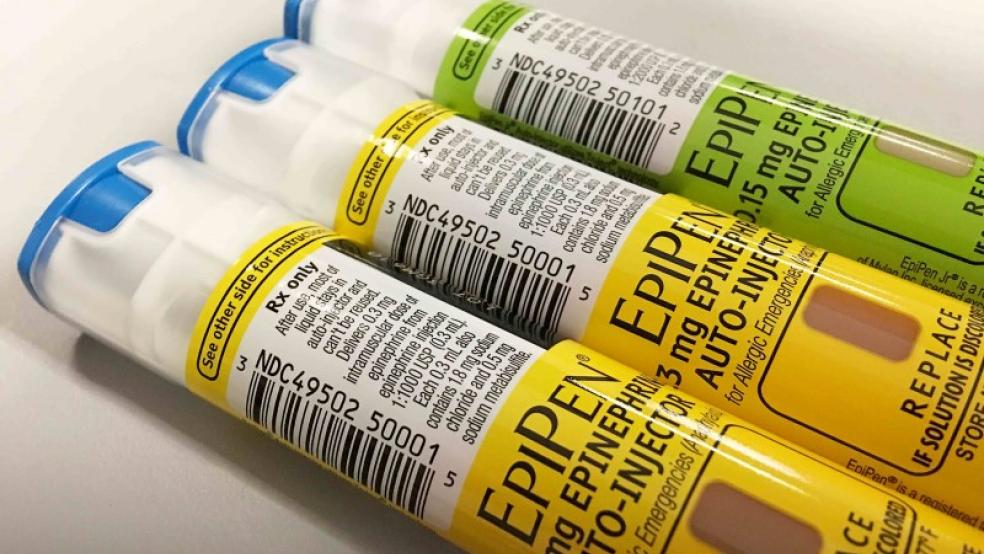Drugmaker Mylan, the maker of the EpiPen auto-injection device vital in saving the lives of victims of extreme allergic reactions, caved under enormous political pressure on Monday and announced it would take steps to effectively slash by half the list price of the highly popular brand.
Mylan has been reeling for weeks amid complaints by Democratic presidential nominee Hillary Clinton, the White House, senior GOP and Democratic senators and tens of thousands of consumers about its price gouging marketing strategy. Since acquiring the rights to the drug injector in 2007, Mylan steadily increased the list price nearly six-fold, from roughly $100 to $600 for a packet of two EpiPens.
Related: Did Mylan Just Cut the Price of the EpiPen? Not Really
Instead of directly reducing the price of EpiPen, however, Mylan said it will begin marketing an alternative generic version at $300 per two-pack beginning in several weeks — roughly half the current cost of the decades-old EpiPen brand, or triple the 2007 price.
The company said the authorized generic will be identical to the branded product, “including device functionality and drug formulation.” It will be available as a two-pack carton in both 0.15 milligram and 0.30 milligram strengths.
The announcement by CEO Heather Bresch comes just a week after the company disclosed plans for new EpiPen coupons covering up to $300 for many patients in health plans who face high out-of-pocket costs. Mylan also agreed to bolster its assistance program for consumers struggling to cover the drug costs by doubling the income level at which families would still qualify for assistance, to 400 percent of the federal poverty level.
Bresch stubbornly resisted calls for a roll back of EpiPen’s list price. She insisted that the price was dictated by company developmental and marketing costs and major shortcomings in the U.S. health system and health insurance policies that have forced consumers to pay large out-of-pocket costs.
But her offer of deep discounts and other benefits for consumers were rejected as essentially window dressing by key lawmakers, including Republican Sen. Charles Grassley of Iowa and Democratic Sen. Amy Klobuchar of Minnesota, as well as by consumer advocates and health care experts.
Related: EpiPen Maker Enters the Pharmaceutical Industry’s Hall of Shame
Similarly, some lawmakers and consumer advocates said the launch of the generic EpiPen doesn’t go far enough.
At $300 generic EpiPens will still cost 3 times more than they did in 2007. This isn't a discount. It's a PR move. https://t.co/b6o4SoZdUC
— Bernie Sanders (@SenSanders) August 29, 2016
Grassley, the chair of the Senate Judiciary Committee and a leading critic of Mylan, said in a statement that “This sounds like good news but the details are important to know.”
“Consumers and Medicare, Medicaid and insurance companies will want to know how widely available the generic product will be," he said. “I look forward to a written response, as specifically requested in my letter to the company, to my questions on behalf of Iowans and public health care programs about the EpiPen cost increases.”
The financial stakes in this controversy are enormous because EpiPen for years has been a cash-cow for Mylan – one that until today was estimated to generate nearly $1.5 billion in sales this year. Bresch, meanwhile, has come under fire for receiving a pay package that climbed 671 percent from 2007 to 2015, to more than $18.9 million last year. And, in what the company described as a pre-planned move, she reportedly sold more than 100,000 of her shares in the company on Aug. 9, earning more than $5 million in proceeds just as the controversy over EpiPen pricing was reaching critical mass.
While the cost-saving measures announced a week ago would largely benefit consumers, the latest plan to bring out a low-cost generic alternative would be a financial boon to insurers and federal health programs including Medicare and Medicaid. Federal and state health care programs and agencies have complained for nearly two years that price-gouging activities by major pharmaceutical companies have strained their budgets to the breaking point.
The EpiPen dispenses epinephrine, a drug that combats the worst of allergic reactions, such as the swelling of necks and chests and the cutting off of air passages. The drug can be administered quickly by jabbing the EpiPen into a patient’s thigh. Many parents buy multiple sets of EpiPens and keep them at home, in their cars and at their children’s schools. Mylan has aggressively promoted and marketed the drug auto-dispenser in schools.
Related: Two Big Reasons Prescription Drug Prices Are So Much Higher in the US
Mylan indicated in its press release today that before it went ahead with its announcement, it needed to get the approval of its partner, Pfizer, which produces the epinephrine used in the auto-injectors. While the brand-name EpiPen has been essential to the company’s long-term success, Mylan is primarily a generics company that competes with other brand-name drugs.
This article was updated at 2:25 p.m. on Monday, Aug. 29.





